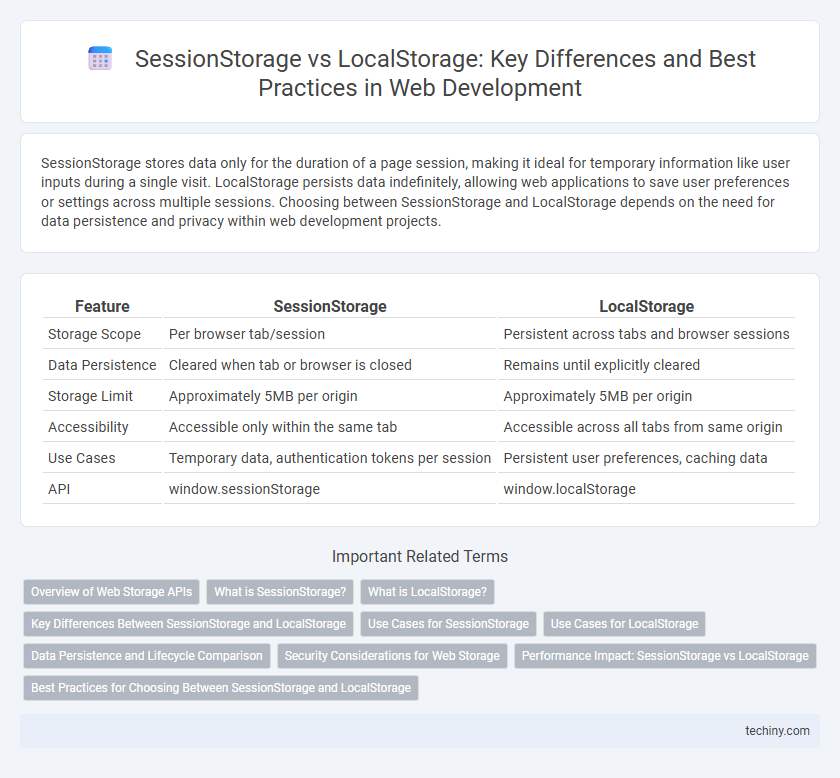SessionStorage stores data only for the duration of a page session, making it ideal for temporary information like user inputs during a single visit. LocalStorage persists data indefinitely, allowing web applications to save user preferences or settings across multiple sessions. Choosing between SessionStorage and LocalStorage depends on the need for data persistence and privacy within web development projects.
Table of Comparison
| Feature | SessionStorage | LocalStorage |
|---|---|---|
| Storage Scope | Per browser tab/session | Persistent across tabs and browser sessions |
| Data Persistence | Cleared when tab or browser is closed | Remains until explicitly cleared |
| Storage Limit | Approximately 5MB per origin | Approximately 5MB per origin |
| Accessibility | Accessible only within the same tab | Accessible across all tabs from same origin |
| Use Cases | Temporary data, authentication tokens per session | Persistent user preferences, caching data |
| API | window.sessionStorage | window.localStorage |
Overview of Web Storage APIs
Web Storage APIs, including SessionStorage and LocalStorage, provide key-value storage accessible within the browser for client-side data persistence. SessionStorage stores data for the duration of the page session, automatically cleared when the tab or window closes, making it ideal for temporary data. LocalStorage offers persistent storage that remains even after the browser is closed, supporting long-term data retention for web applications.
What is SessionStorage?
SessionStorage is a web storage object that allows developers to store data for the duration of a page session, meaning the data is available only while the browser tab is open. It provides a way to persist data temporarily without affecting other tabs or windows, ensuring session-specific information remains isolated. Unlike LocalStorage, SessionStorage data is automatically cleared when the browser tab is closed, making it ideal for storing sensitive or transient data during a single user session.
What is LocalStorage?
LocalStorage is a web storage API that allows websites to store data persistently in a user's browser with no expiration time, making it ideal for saving user preferences, themes, and session information. Unlike SessionStorage, LocalStorage data remains available even after the browser or tab is closed, providing a more durable client-side storage solution. It supports storing key-value pairs with a typical storage limit of around 5-10 MB per domain, enabling efficient offline access and improved web application performance.
Key Differences Between SessionStorage and LocalStorage
SessionStorage stores data for the duration of a page session and is cleared when the tab or browser is closed, whereas LocalStorage provides persistent data storage that remains even after the browser is closed and reopened. SessionStorage is limited to each individual tab, meaning data is not shared between tabs, while LocalStorage data is accessible across all tabs from the same origin. Both are part of the Web Storage API, support key-value pair storage, and offer more storage capacity than traditional cookies but differ significantly in lifespan and scope.
Use Cases for SessionStorage
SessionStorage is ideal for storing data that needs to persist only during a single browser session, such as user authentication tokens or form inputs on multi-step processes. It is particularly useful for scenarios where data should be cleared automatically when the tab or browser window is closed, ensuring privacy and reducing memory usage. Web applications benefit from SessionStorage when temporary state management is required without polluting the browser's localStorage or server-side session data.
Use Cases for LocalStorage
LocalStorage is ideal for storing persistent user data such as preferences, theme settings, and authentication tokens that need to remain available across browser sessions. It supports large storage capacity, up to 5-10 MB depending on the browser, making it suitable for caching non-sensitive information to improve website performance. LocalStorage data is accessible only within the domain origin, enhancing security by isolating data from other websites.
Data Persistence and Lifecycle Comparison
SessionStorage stores data for the duration of the page session, automatically clearing data when the tab or browser is closed, ensuring temporary data persistence ideal for sensitive or session-specific information. LocalStorage offers persistent data storage with no expiration, retaining information until explicitly deleted, making it suitable for saving user preferences or long-term application states. Both storage types are part of the Web Storage API but differ significantly in lifecycle management and use cases related to data persistence.
Security Considerations for Web Storage
SessionStorage provides data storage limited to the duration of a page session, reducing persistent risk compared to LocalStorage, which retains data indefinitely across sessions, increasing exposure to Cross-Site Scripting (XSS) attacks. Both storage types are vulnerable to XSS, but neither offers built-in encryption or protection against malicious script access, requiring developers to implement additional security measures like Content Security Policy (CSP) and input validation. Storing sensitive information in Web Storage is generally discouraged; instead, use secure, HttpOnly cookies or server-side session management to enhance data protection.
Performance Impact: SessionStorage vs LocalStorage
SessionStorage and LocalStorage both offer fast client-side data storage with minimal performance overhead, but SessionStorage is limited to the lifetime of the browser tab, providing slightly faster access due to its scoped nature. LocalStorage persists data even after the browser is closed, which can lead to increased memory usage and slower access times when storing large amounts of data. For performance-sensitive applications, SessionStorage is preferred for temporary data, while LocalStorage suits scenarios requiring persistent data retention.
Best Practices for Choosing Between SessionStorage and LocalStorage
When choosing between SessionStorage and LocalStorage, prioritize data lifespan and scope: use SessionStorage for temporary data that should clear when the browser tab closes, ensuring session-specific privacy and reducing persistent storage risks. Opt for LocalStorage to store data that must persist across sessions, such as user preferences or offline cache, while managing security by avoiding sensitive information due to its persistent nature. Always implement proper data validation and encryption regardless of storage type to maintain application security and data integrity.
SessionStorage vs LocalStorage Infographic

 techiny.com
techiny.com